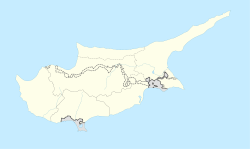Emergency Response Unit (Cyprus)
| Emergency Response Unit Mechanokiniti Monada Amesis Drasis Μηχανοκίνητη Μονάδα Άμεσης Δράσης (Μ.Μ.Α.Δ.) | |
|---|---|
| File:Cyprus Police Emergency Response Unit Logo.jpg | |
| Agency overview | |
| Formed | 1978 |
| Jurisdictional structure | |
| Operations jurisdiction | CY |
| Governing body | Cyprus Police |
| General nature | |
| Operational structure | |
| Headquarters | Near Cyprus Police HQ, Aglantzia, Nicosia, Cyprus |
| Police Officers | 215 |
| Facilities | |
| Facilities | 2 |
The Emergency Response Unit (E.R.U) (Greek: Μηχανοκίνητη Μονάδα Άμεσης Δράσης; Μ.Μ.Α.Δ., romanized: Mechanokiniti Monada Amesis Drasis; MMAD)) is a unit of the Cyprus Police, the national police of the Republic of Cyprus. The mission and responsibilities of the Emergency Response Unit are closely interwoven with the security of the State, the maintenance of law and order and the provision of help and services to the public. The characteristic features of this unit are discipline, training, team-work, team-spirit and thorough organisation. Its Commander is accountable to the Chief of Police through the Assistant Chief of Police in charge of Support.[1][2]
The Emergency Response Unit, known up until recently as the Mobile Immediate Action Unit, which was a direct translation of its name in Greek, was set up in 1978 after a government decision.[3] The Government at the time responded to an increase in terrorism in the Eastern Mediterranean, as well as to a number of incidents of terrorism that took place in Cyprus.[4] The first commander of the unit was Costas Papacostas, a National Guard Major, who was transferred to the Police. Moreover, the first members of the unit had previous service in the Special Forces of the National Guard.[5]
Mission[edit]
The primary mission of the Emergency Response Unit is the operational support of policing throughout the Republic in combating organised, violent acts or crimes such as terrorism. It is also responsible for providing protection to VIPs and suppressing riots.[6][7]
The secondary mission of the Emergency Response Unit is the provision of aid, services and rescue in cases of natural disasters or major accidents.[6]
The unit also supports all other police departments and divisional headquarters in carrying out their operations.[8]
Structure and organization[edit]
The Emergency Response Unit is split into several branches to better handle the operations that are assigned to the Unit.[9][10]
Security squads[edit]
There are five security squads. Four out of the five Security Squads operate on the basis of a 24-hour shift executing the duties of the Unit, whereas the fifth Squad follows a training programme. In this way, every five weeks each squad undergoes one week of intensive training.
Technical Support Squad[edit]
This squad provides technical support to the Unit in terms of the construction of any devices or equipment needed, as well as the provision of any means of transport or communication.
Transfers Squad[edit]
This squad handles the transportation from the holding cells to the court, of people who are under trial. This task has been specifically assigned to the Emergency Response Unit due to their high level of training to prevent people escaping while undergoing trial. It is staffed by personnel transferred temporally from the security squads for a short period of time on a rotation schedule. This insures that all personnel manning the transportations squad maintain their high level of readiness.
Special Antiterrorist Squad (SAS)[edit]
The Special Antiterrorist Squad (SAS) (Greek: Ειδικό Αντιτρομοκρατικό Ουλαμό; E.A.O., romanized: Eidikos Antitpomkpatikos Oylamos; EAO) was set up in 1978 and since then it has been an integral part of the Emergency Response Unit. Its mission is to deal with high risk incidents which require an armed response, such as terrorist attacks, hijackings, arrests, hostage rescue etc. Because of the nature of the duties carried out by the Squad, its members are selected personnel who undergo intensive training. These members are selected from a group of personnel who volunteer for service with the Squad. This Squad is also well equipped, so as to secure the readiness of its members to undertake highly dangerous missions.
Anti-poaching team[edit]
The anti-poaching team was established in 2007 on the instructions of the Chief of Police. The objectives of the team are to prevent and combat poaching, to provide every possible assistance to hunters, to conduct training on hunter safety and law awareness and to widen and strengthen the cooperation of the Cyprus Police with all relevant to hunting in Cyprus agencies.
See also[edit]
- Cyprus Civil Defence
- Cyprus Fire Service
- Cyprus Joint Rescue Coordination Center
- Cyprus Police
- Cyprus Police Academy
- Cyprus Port & Marine Police
References[edit]
- ↑ "Administration". Cyprus Police. Retrieved 9 December 2019.
- ↑ "Cyprus Police Organisational Chart" (PDF). Cyprus Police. September 2015.
- ↑ "Background Information". Cyprus Police. Retrieved 9 December 2019.
- ↑ "Background Information". Cyprus Police. Archived from the original on 10 May 2019.
- ↑ "Ιστορική Αναδρομή". Cyprus Police (in Greek). Archived from the original on 3 October 2013.CS1 maint: Unrecognized language (link)
- ↑ 6.0 6.1 "Αποστολή". Cyprus Police (in Greek). Archived from the original on 3 October 2013.CS1 maint: Unrecognized language (link)
- ↑ "Mission". Cyprus Police. Retrieved 9 December 2019.
- ↑ "Operational Capabilities". Cyprus Police. Retrieved 9 December 2019.
- ↑ "E.R.U Organizational Structure". Cyprus Police. Retrieved 9 December 2019.
- ↑ "Μηχανοκίνητη Μονάδα Άμεσης Δράσης". Cyprus Police (in Greek). Retrieved 9 December 2019.CS1 maint: Unrecognized language (link)
External links[edit]
This article "Emergency Response Unit (Cyprus)" is from Wikipedia. The list of its authors can be seen in its historical and/or the page Edithistory:Emergency Response Unit (Cyprus). Articles copied from Draft Namespace on Wikipedia could be seen on the Draft Namespace of Wikipedia and not main one.


